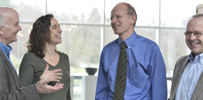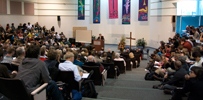Stories from the Lausanne Global Workplace Forum

It turns out that professors aren’t the only ones who get opportunities to roam the globe, taking part in international theological movements. Gustavo Santos (MATS ’17), the Program Administrator for our Master of Arts in Leadership, Theology, and Society, just got back from Manila, where he participated from June 25–29 as an invited guest at the Lausanne Global Workplace Forum (GWF).
The GWF is an outworking of the larger Lausanne Movement initiated by Billy Graham in 1974. Leaders of the third Lausanne gathering that took place in 2010 in Capetown, South Africa came up with the idea of the GWF. In the Capetown Commitment, they identified key spheres where evangelicals need to turn their attention if the gospel is to be spread more effectively. One of these spheres was the workplace. The Capetown Commitment noted that if the evangelical church was going to be faithful to its global mission, it must help the working world see what the gospel means for the 9–5.
While there have been other smaller outworkings of the Capetown Commitment’s vision, this Manila event is the largest to date. Over 800 people showed up from around the world—all Christians with an established voice in the work-faith movement. Together they compared ideas and strategized how Christ might continue to transform the modern workplace.
Naturally, we peppered Gustavo with questions shortly after he arrived back from Manila. Hear him discuss the Forum, the role of Regent College in the world of workplace theology, and the problem with workplace fulfilment.
Regent: Tell us the story: how did you end up at The 2019 Global Workplace Forum?
GS: What happened was in 2016 there was another gathering, the Young Leader Generations Gathering in Jakarta, Indonesia, that is also a spin-off gathering of the Lausanne Movement. In 2016 they gathered leaders from all around the world as well—young leaders, I think under 40, to talk about evangelization and the mission of God in the church. People who went there were asked for nominations. They were asked: we’re going to do this global workplace forum in 3 years or so. Who do you think could be good people to come and have this conversation? I think 2 or 3 people mentioned my name, and they contacted me and invited me to go as someone who is part of this faith and work conversation.
But at that time you weren’t the MALTS Administrator. So how did they know about you?
I was not, but I was having conversations about it. I was studying here at Regent and connected to other people. Actually, I think this goes back to Brazil, because even there before I came to Regent the people in Brazil that knew me, they knew I was interested in this faith and work conversation.
How long was the conference? What did it look like? How was it structured?
The structure was really simple. The mornings were the main sessions. Everyone was together in the same place and there were a few speakers and a Bible study. We went through the Book of Daniel. Everyone sat at tables with people who were working in the same sector, so I was at an education table. I had people from Australia, India, Latvia, Pakistan, and Hong Kong at my table. So that was fun: all these people worked in education and were talking about faith and work.
The afternoon had seminars and labs. You would have 120 options. This is not just an expression—120 options over the week to pick and choose from. In the evening everybody was together again for moremain sessions.
I was invited to be part of a group that would meet every day to talk about workplace ministry—which is one of the network issues that Lausanne is working with. It was a work group where people from all over thought about how we can create resources for workplace ministry in the world. It was a very rich conversation.

Did you encounter anything you really wanted to take back to Regent and your work here?
I think for me the most important thing that came up was the conversation around vocation for those who are not professionals. In a way the faith and work conversation has become very professionalized. And when I say professionalized I mean it’s for people who are usually high or mid-class professionals who go to colleges or have university degrees and they’re able to choose their careers or shape their careers with a lot of autonomy—whereas maybe 80 or 90 percent of the world does not have these options.
Coming from Brazil, a working-class family, and learning the theology of work, I think that theology of work should work for everyone.
I feel that when we talk about vocation in terms of fulfilment, many people are just left out, because fulfilment sometimes is not even a question; it’s about survival and putting food on the table. There’s a romantic way of seeing work that is not helpful for most people. That came up several times, even in the main sessions. I was glad to see that was happening. Somehow people are getting more and more aware that if you want to move the faith and work conversation, we need to embrace more people; we need to embrace more experiences around the world.
One more question on this discussion around fulfilment: I suspect you would affirm that fulfilment is important at least in some way, if expressed with the right naunce. What’s a redeemed way of speaking about fulfilment?
I think as theologians or people who do theology we need to be able to hold the tension between the hope we have in Jesus and how hard work life is. If we have a romantic view of work and we say that the only way of working is to have all the fulfilment in the world and have fun, it causes even more pain to those who don’t have options. I think our job as people who do theology of work is to hold the tension of the hope of a perfect world with Jesus against the fact that we are not there yet. We still have to deal with the questions of daily life and the mundane.
A good question to ask before the question of fulfilment is what does success look like? I think our culture measures success in a way that’s not aligned with the biblical view of success. When all is said and we’re in front of Jesus and he asks us how did it go, he’s not going to ask: Did you have fun? Did you win? Were you the best? Were you the first? I think the question’s going to be: How faithful were you with the things that I gave you? So the answer to the question what is success? is more related to faithfulness than achievements or fulfilment.
Another reason I like the language of faithfulness is that it resonates deeply when I’m talking about the working class and people who don’t have many options in life. They understand much better than the professional class that life just happens. I think the professional class has an illusion that they can control things. But that’s really just an illusion. When people don’t have many options they’re better equipped to deal with the question of faithfulness because they understand that life just happens and everything we have is a gift.
One of the biblical stories that is guiding me in this work is the story of Ruth, because she’s a gleaner. For me the book of Ruth has it all. It’s crazy how good it is. One thing that’s interesting is that she’s a gleaner. She takes whatever’s offered and makes the best of it. I think that should be our posture toward work. We are receivers of everything that God gives us and our job is to be faithful to whatever we have. It might be that you have a college degree and have the opportunity to go to university. Make the best of it. It might be that you don’t. That’s fine. What hurts me is to see the faith and work conversation unfolding at the professional level and then we don’t have anything to say to those people who are in the church and just like, “Ok I work at the supermarket as a cashier. Don’t I have a vocation?” I cannot stand this.
Having taken part in the international dialogue around work and theology, can you comment on what role Regent has in this conversation?
Regent is recognized as a place that has done this for a while. When I was there I had a glimpse of what’s happening in the world, and it’s so big. So big. Many times I felt small. Not small as in not valuable, but there is so much happening in so many different fronts. One of my sentiments when I left was this is really something that God is doing. No one person or institution in the world can hold the conversation alone.
I feel like we’re on the right path. Two things in particular come to mind. One: the delivery system, particularly with MALTS. People are getting more and more mobile, but at the same time they have less and less time to get education. Every time I described the MALTS program’s low-residency, cohort-based delivery system, people would get really excited, because they were all professionals who have a few weeks of vacation over the year. They are interested in theological education and want to integrate their knowledge, but they don’t have time. All over the world people are craving more education but they don’t know how to get it. We have the online options which are good for many cases, but being able to come and be part of a cohort that spends blocks of time on-campus is something that really attracts people. People get excited when they hear about it.
And the second thing in terms of content itself is that the whole conversation about faith and work is converging to integration. People are tired of having fragmented lives. They want to be able to see their work as something that’s part of life, not only something they do. So the whole conference was focused on that: the secular-sacred divide is a false dichotomy. And Regent is very good at making that clear. This is our language all the way. I think that our content and our ways of delivering the content are in line with what’s happening in the world.
Thank you very much for the update.




